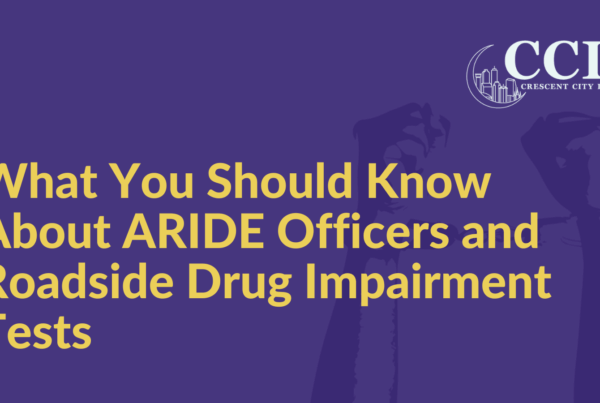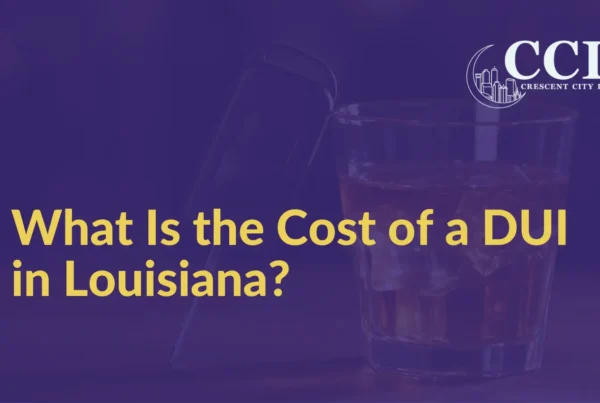At Crescent City Law, we help people across New Orleans understand the serious legal consequences that come with protective orders—especially when firearms are involved. Whether you’re seeking protection or responding to a civil order, it’s critical to understand your rights and responsibilities. Our criminal defense team, led by seasoned advocate, John Radziewicz, is here to provide support, guidance, and strong representation when it matters most. If you need help now, contact us, learn more about us, or explore our criminal defense services.
What This Blog Covers
This post focuses on firearm prohibitions tied to civil protective orders in Louisiana. The information comes from Section 3 of the 2025 Louisiana Protective Order Registry (LPOR) Quick Reference Guide to Firearms Prohibitions.
Understanding how firearms prohibitions work in civil cases is important for both parties involved in a protective order—the petitioner seeking safety and the respondent who may lose their legal ability to possess or transfer firearms.
When Firearms Prohibitions Apply Under Louisiana Law
State and federal firearms prohibitions may apply when a court issues a protective order under any of the following Louisiana statutes:
- La. R.S. 46:2131 et seq. — Domestic Abuse Assistance Act
- La. R.S. 46:2151 — Protection from Dating Violence Act
- La. Children’s Code Art. 1564 et seq. — Domestic Abuse Assistance in Juvenile/Family Court
For these prohibitions to take effect, specific conditions must be met:
Required Court Findings:
- The court must make a clear finding of domestic abuse or dating violence.
- There must be a qualifying relationship between the parties (e.g., spouses, parents, romantic partners).
- The respondent must have been given notice and an opportunity for a hearing before the order was issued.
If these criteria are met, federal and/or state law may prohibit the person from possessing or purchasing firearms.
Duration and Compliance Requirements
Firearms prohibitions under civil protective orders don’t last forever, but they must be taken seriously. The court order will specify how long the restriction applies. During that period:
- The person subject to the order cannot possess or purchase firearms.
- Failure to comply can lead to criminal charges and arrest.
Firearm Transfer Orders: What You Need to Know
When the court includes a firearms prohibition, it often issues a Firearm Transfer Order as part of the civil protective order. This order outlines:
- How and when the person must transfer their firearms
- What documentation must be submitted as proof
Timeframe for Transfer
According to the 2025 LPOR Guide:
- Firearms must be transferred within 48 hours, not including legal holidays
- If the firearms were sold or transferred before the order was issued, the respondent must submit a Proof of Transfer Form within 10 days
The Proof of Transfer Form must be:
- Signed by the person receiving the firearm
- Witnessed and verified
Relevant LPOR Forms With Firearm Instructions
Several Louisiana Protective Order Registry forms now include specific firearm provisions. These include:
- LPOR 3 — Temporary Restraining Order with firearm restriction
- LPOR 9 — Permanent Protective Order
- LPOR 20 — Firearm Transfer Order
- Their corresponding “-R” forms for reconvention cases
These forms clearly state the transfer deadlines and legal responsibilities. It’s important to read every section carefully if you receive one.
Why This Matters
Firearms prohibitions are treated very seriously in protective order cases. Courts, law enforcement, and prosecutors view failure to comply as a public safety issue. For someone under a protective order, a single mistake related to firearm possession could result in arrest, added charges, and harsher penalties.
For people requesting protection, understanding what a firearms restriction can do offers peace of mind and potentially lifesaving enforcement.
Working with a defense attorney can help you understand the implications of any firearms-related terms and avoid preventable violations.
Final Thoughts: Stay Compliant and Stay Safe
Firearms prohibitions tied to civil protective orders in Louisiana are strict, detailed, and time-sensitive. Whether you’re filing for protection or responding to an order, understanding the transfer rules, deadlines, and documentation is essential to staying compliant and protecting your rights.
If you need help handling a protective order with firearms restrictions in New Orleans, Crescent City Law can walk you through your next steps. Call us today at 504-264-9492, contact us online, visit our homepage, or check out our New Orleans criminal law blog for more insights.
We’re here to stand by you and make sure you’re not alone in the process.
FAQs
1. What happens to my firearms if I am placed under a civil protective order in Louisiana?
If the court finds evidence of domestic abuse or dating violence and issues a qualifying protective order, you may be legally prohibited from possessing or purchasing firearms. You will likely be required to transfer them under a Firearm Transfer Order.
2.How long do firearms prohibitions last under a protective order?
The prohibition lasts as long as the protective order itself. The order will specify the duration, and once it expires, the restriction is lifted—unless other laws apply.
3. How quickly do I need to transfer my firearms after receiving a Firearm Transfer Order?
Under the Louisiana Protective Order Registry (LPOR) Guide, firearms must be transferred within 48 hours, not including legal holidays. Proof of transfer must then be submitted within 10 days.
4. What counts as valid proof of a firearm transfer?
You must complete a Proof of Transfer Form, which must be signed by the person receiving your firearm and witnessed or verified. This documentation is essential to show compliance.
5. What are the penalties if I don’t comply with a firearms prohibition?
Failure to transfer your firearms or continued possession during a prohibition period can result in arrest, new criminal charges, and additional penalties. Courts treat violations very seriously.
6. Can I get legal help if I’m facing firearms restrictions under a protective order?
Yes. A defense attorney can help you understand your responsibilities, ensure compliance, and protect your rights. Crescent City Law assists clients in navigating these complex rules to avoid mistakes and harsh consequences.






